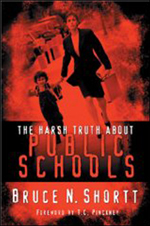The Harsh Truth About Public Schools
 The Harsh Truth About Public Schools is written by a lawyer. In it, Bruce N. Shortt pulls out all the stops to make his case against public schools. It begins with the cover: a harried, suited, preoccupied woman with a briefcase and a newspaper is pictured dragging a smiling, backpacked child by the hand in a slightly tilted photo that suggests the world is falling off its axis. The pages are liberally sprinkled with passages italicized in evident fear that the prose itself can’t be relied upon to adequately convey its urgency. The narrative voice alternates between serious and sarcastic. And the language is (at times) hysterical and accusatory: the first chapter, for instance, is titled, “Why Are You Sending Your Child to a Pagan Seminary?”
The Harsh Truth About Public Schools is written by a lawyer. In it, Bruce N. Shortt pulls out all the stops to make his case against public schools. It begins with the cover: a harried, suited, preoccupied woman with a briefcase and a newspaper is pictured dragging a smiling, backpacked child by the hand in a slightly tilted photo that suggests the world is falling off its axis. The pages are liberally sprinkled with passages italicized in evident fear that the prose itself can’t be relied upon to adequately convey its urgency. The narrative voice alternates between serious and sarcastic. And the language is (at times) hysterical and accusatory: the first chapter, for instance, is titled, “Why Are You Sending Your Child to a Pagan Seminary?”
Because of these things, I was fully prepared to dislike this book — a gift from a relative — and truth be told I found it a challenge. But in fact I’m glad I read it, and my final evaluation is a thumbs-up. I value this book, aimed primarily at Christians, first as a source of information, second as a source of encouragement in the effort to homeschool my children.
First, the bad news. At times I found the tone needlessly snarky. I felt I was being manipulated by a prosecutor eager to sway the jury. Since the reader gets to be both judge and jury of this book, I both register and sustain these objections. A dose of humility and gentleness, and a greater acknowledgment that there are some good people involved in public education, would go a long way toward making this prose more readable. The last chapter, a “Postscript to Teachers and Administrators,” is addressed to the quality educators who find themselves involved in a system that’s not working, but there’s a pretty good chance that said educators wouldn’t ever get to the final chapter because not enough attention is paid to them in the preceding pages.
I found this book’s interpretation of history raised some questions. I’m not sure about Shortt’s claim that literacy enjoyed a greater depth and breadth in early America than it does now. I wonder if the book is presenting a view colored by nostalgia. I also hesitate before Shortt’s insistence that Protestantism involved a high value on education. Another book I read recently, Total Truth, suggested that the revival tradition that flourished during westward expansion was notoriously simplistic, and contributed to the anti-intellectualism within the church that has rendered Christianity so ineffectual in the public square of ideas.
Unfortunately, though, as a description of the current state of education in America, the book’s unhappy thesis is credible — in fact, given the wealth of proof here, inarguable. Shortt’s evidence that “the government school system as an institution is driven by interests that are largely unrelated to any meaningful conception of education” is thorough and well-documented, and the back of the book contains plenty of resources for the skeptical reader to investigate the facts. Though I was not surprised at anything I read about the legal history of the “wall of separation” between church and state, the inconsistency with which it is enforced, the prevalence of certain quasi-religious philosophies and practices in the public schools (he calls them “government schools,” actually), the failure of reform efforts, and the general bureaucratic nightmare public education and its associated unions have become, it was sobering to get it all in one chunk like this.
As a homeschooler, I loved the chapter on home education. It provides plenty of evidence against the notion that homeschoolers are socially handicapped by their experience, and gives a number of results from tests and studies that demonstrate the effectiveness of homeschooling at equipping people to live meaningful, productive, well-educated lives. Shortt believes that if all Christians took their children out of public school, they would be engaging in the culture wars rather than “pre-emptively surrendering.” If Christians withdrew their children from public school, he reasons, it would no longer be the cultural norm. “By being faithful in the education of our children,” he writes, “we are in fact adopting the most effective strategy for changing the culture.”
As a parent of young children, I found this book a worthwhile read, though not an enjoyable one. Sometimes the truth hurts — especially if it’s harsh.


